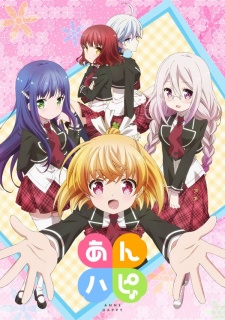
Meeting An from Anne-Happy for the first time, I am instantly reminded of two other first encounters. One is the appearance of Kamijou Touma in A Certain Magical Index, heralded by his trademark cry of “I’m so unfortunate!” I think I never bought that act, because as he is quickly surrounded by the ideal anime harem situation this repetitive comical outburst wears thin, both in terms of comedy and in terms of credibility. The other character is Sayonara, Zetsubou-sensei’s Kafuka Fuuka, who manages to find eternal optimism even in the face of her teacher’s attempted suicide right at the start of the series. At the intersection of these two is An, who, rather than complaining about a false misfortune like Touma, is boundlessly cheerful and positive even as the universe repeatedly and tangibly smacks her in the face. And it works; maybe it is the naïve attitude she takes or the breathier excited voice that voice actress Hanamori Yumiri gives her, but when she talks about all the enjoyment she gets out of her life and her friendships, it’s enough to make me even feel jealous of the poor sap.
Her worst stroke of luck is being singled out for having such misfortune, and being enrolled in the bizarre “happiness class” at her school as a result. In a clear violation of national education requirements, the focus for the happiness class is to improve their abysmal luck for the sake of achieving happiness in the future. Worse still, their metric for “luck improvement” is by grading the students based on their performance on entirely chance-based activities, which range from life-sized board games to a giant underground casino with a secret RPG-based coliseum in the backroom. And with An’s ability to find the optimally unfortunate outcome in any scenario, even menial tasks such as keeping an egg from cracking for a day or cooking in home ec become dangerous and irrelevant of any skill or forethought. Maybe the teacher is on to something: no amount of public education would help someone like An get a job with that level of luck.
Despite the focus on the day-to-day activities, assignments, and crazy games in the happiness class, Anne-Happy is distinctly a slice of life, watching the class through the lens of An’s friendship with her bizarre compatriots. Some are more grating or ill-defined, such as Hibiki the braggart who pretends to be above needing friends. Others are more of a mixed bag, such as a girl named Botan with a crushing inferiority complex and a propensity for getting seriously injured, or Hibari, who has a generic worrywart personality but the incredibly odd setting of having fallen head over heels for the bowing cartoon man on construction site warning signs. Their group dynamic bears the trademark of the anime high school, namely the feeling of “nakama” that leads them to worldly success through relying on one another, a very Japanese mentality for both school and the world beyond. But in this bizarre luck-based world where individual misfortunes ruin the group more often than not and meritocracy is practically non-existent, I wonder if these friendship tropes aren’t being used to create the exact opposite effect.
And while the slice of life side of Anne-Happy does less to stand out, the comedy that comes through their constant struggle with the happiness class—trying to survive as a group while all inadvertently pulling each other further and further into the abyss—is amusing at worst and hilarious at best. A high school class is taken to ridiculous extremes with the expensive (and fairly useless) facilities and technologies used to test their luck, and their administrators run the gauntlet from normal teachers to an anthropomorphic robot bunny, who in the course of the show clones himself, raps, and chases the students down from a flying attack drone. There is a moment near the end where An’s luck reaches a catastrophic level, opening up a volcanic rift in the middle of a garden while playing hide-and-seek, and watching her dangling on the edge of the cliff I realized that there was still no sense of tension or danger whatsoever. On one hand that should be expected from a comedy slice of life, but even with real drama present the show is good at getting us used to their failures. Or maybe it’s that at the end of the day, despite maximal misfortune they find ways to be maximally happy and positive in tandem, so what reason do we have to feel worried?